When Michael rows his boat ashore in the old camp fire song, across a Jordan River chilly and wide, he comes across a land of milk and honey.
These days, intensive water exploitation, industrial agriculture, sewage inflows, drought and regional conflict have narrowed the river to a murky trickle — a mere two percent of its flow in the mid-twentieth century.
And the indigenous inhabitants of this seemingly desolate but highly fertile landscape — the descendants of shepherds Michael might have greeted as he stepped out of his boat — are now the victims of land confiscation, property destruction and violent assault.
On a recent trip to the Jordan Valley, the Green Planet Monitor (where this post first appeared yesterday, with an audio story) visited several Bedouin communities threatened by Jewish settlements, and by Israeli soldiers and police tasked with protecting them.
The Jordan Valley comprises a quarter of the occupied West Bank. Ninety percent falls within “Area C” — the hefty slice assigned to Israel under the terms of the 1994 Oslo Accords, where Israeli settlements have been established, all illegal under international law.

Given its vast area, sparse population and generous water supply, the Jordan Valley is considered to hold vast development potential for a future Palestinian state, both in manufacturing and agricultural sectors. According to a study cited by Israeli human rights organization B’Tselem, Jordan Valley resources could be parlayed into 200,000 jobs and a billion dollars in agricultural exports.
But Israel has vowed to retain the valley in any future “peace” deal, ostensibly for security reasons — although the Kingdom of Jordan, on the river’s eastern bank, has been a compliant ally for over two decades.
In reality, Israel’s insistence on retaining the valley reflects its long-articulated aim of increasing the Jewish population from the river to the sea, seizing as much land, containing as few Palestinians, as possible.
Towards this end, Israeli practices in the Jordan Valley are similar to those implemented elsewhere in the West Bank and annexed East Jerusalem: systematic denial of construction permits, demolition of non-permitted structures — including livestock sheds, homes, water cisterns and associated infrastructure — and denial of access to Israel’s electricity grid and national water network (to which illegal settlements are connected).
The cutting edge of Israel’s strategy in the Jordan Valley, as elsewhere, is its settlement enterprise. Over ten thousand Jewish settlers live in forty Jordan Valley settlements and outposts, Israeli human rights organization B’Tselem reports, citing 2011 data. Roughly the same number of Palestinians live in some twenty communities, three thousand of them Bedouin shepherds.
Settlements have “no legal validity” and constitute a “flagrant violation” of international law, UN Security Council Resolution 2334 declared in December 2016. Numerous similar declarations have been passed over the years, all of them ignored by Israel and unenforced by the international community. (Indeed, the US and Canada provide tax deductions to citizens who invest in settlements, and several top members of the Donald Trump administration are settlement benefactors.)
Jewish settlers are the sharpest edge of Israel’s expansionist wedge. The shock troops. Wherever they pop up, Israeli soldiers and police invariably follow. Most settlers are not violent, says Rabbi Arik Ascherman in this audio story. Some are. In a recent incident, Ascherman and a group he was leading near the Bedouin village of Auja, north of Jericho, in the central Jordan Valley, were set upon by club and knife-wielding “settler youth.”
Settlers are rarely arrested or prosecuted for violent acts they commit
Earlier this month, Ascherman and Ta’ayush activist Guy Hircefeld guided a dozen Israelis from Tel Aviv and Jerusalem on a tour of the northern Jordan Valley, where several outposts have popped up since 2016. Israeli soldiers tailed the group, blocking their path in a couple of locations and threatening to arrest them on a public road.
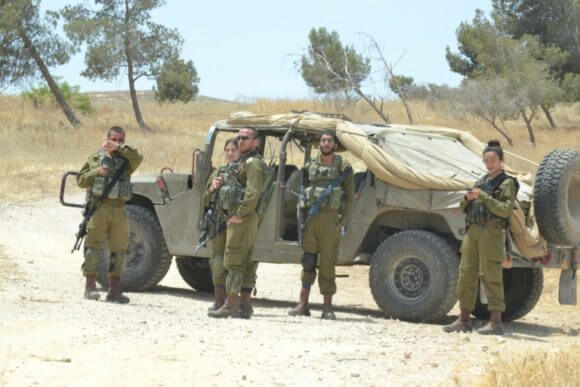
Near the Palestinian village of Ein al-Beida — a half dozen kilometers south of the Green Line separating the northern West Bank from Israel, just west of the Jordanian border — they met Palestinian shepherds now boxed in between the illegal outpost of Um Zukha and an adjacent army base. The scenario is familiar: Settlers harass them, sometimes violently, and then the army steps in, ostensibly to separate the two sides. The area is then declared a “closed military zone,” and the Palestinians are detained for good measure.
Soldiers and settlers typically carry on like chums. Young and on brief tours of duty in the area, soldiers often receive guidance and instructions from settlers and local security personnel, themselves ex-soldiers.
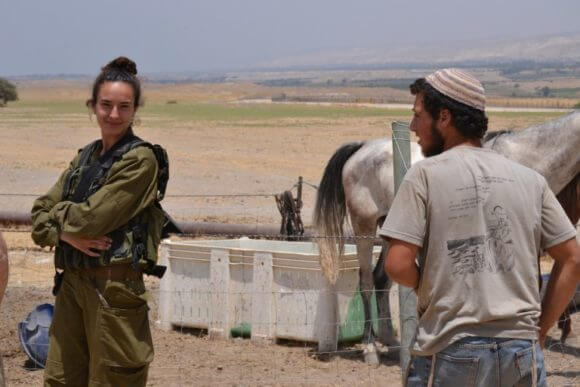
In the Jordan Valley, encounters of this sort typically revolve around water — a seemingly scarce but actually plentiful resource, says Hircefeld in this audio story. Jewish settlements and outposts receive the lion’s share of life’s most vital resource.
In the past, a large aquifer beneath the Palestinian village of Bardalah has fueled local greenhouses and cattle production. But in response to complaints from nearby Mehola settlement, the state water utility, Mekorot, has been combing Bardalah and neighboring villages for “illegal” water connections, accompanied by the Israeli army. In early June, Palestinian greenhouses packed with fruits and vegetables, near Bardalah and Bet She’an, along the Green Line, had their water supply cut. Formerly self-sufficient Bedouin villages must now truck in water.
Meanwhile, spring-fed watering holes have become points of friction between indigenous Bedouins and Jewish colonists who consider these lands God-given. Earlier this month, beside a watering hole where Ein al-Beida residents water their cows, a half dozen settler youth lounged around a table in the shade of a tree. Two of the soldiers who’d been trailing the Ta’ayush group stood by and watched.
“We are here to protect the civilians — you and everybody,” an Israeli soldier told the GPM, gesturing toward the Jordanian border, several kilometers in the distance. “You have to have security when you’re coming here.”
“You’re fucking liars!” Guy Hircefeld yelled at the soldier, who’d professed to know nothing about this being Palestinian-owned land. Hircefeld recently showed soldiers an Israeli Supreme Court ruling that the watering hole and 5000 surrounding dunums belong to Palestinians, he says. Army, settlers and Israel’s Civil Administration [lead occupation authority] have ignored the ruling, says Hircefeld.
“They know everything,” Hircefeld fumed. “But they are liars, they are thieves, and they are miserable. These are our fucking soldiers.”
“You don’t understand it right,” the soldier responded, when asked to confirm that Palestinians own this land. “I get orders and I follow them.”
“You were there! You were there! You were with me! Why are you lying?” Hircefeld shouted back. “This is what they teach you in the army? To lie? Eh? Eh?”
“He’s always angry,” the soldier muttered, when asked to respond to Hircefeld.

Hircefeld walked away in a huff. “[Palestinians] have been living here for ages. Like, forty, fifty, some of them one hundred years here,” he says in this audio story. “And suddenly, fucking Jewish settlers are coming and saying ‘That’s mine, you don’t allowed to come here anymore. And the army protects them. And the police protect them. It’s part of the system.”
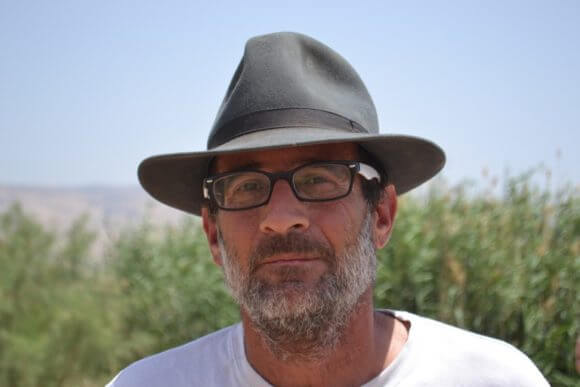
Up the road, at a blue-green, reed-filled watering hole where Palestinian-owned cattle bathe and drink, when given the opportunity, we spoke with a man from Ein el-Beida who walked kilometers to get here. For the past five years, he and fellow villagers have been forbidden to bring their cattle here, and are only doing so today because Jewish activists are accompanying them. Soldiers say it’s a closed military zone, all the while allowing settlers to come here with their own cattle, the Bedouin says.
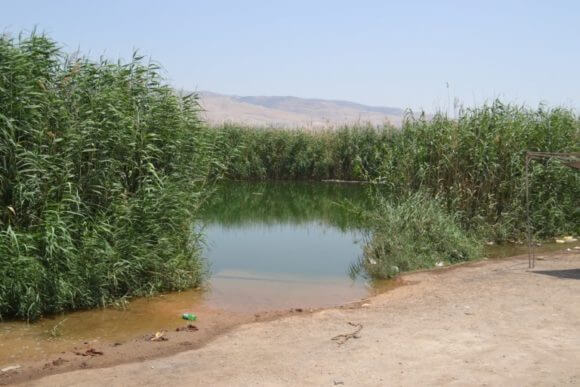
“Every day we have problems,” says the shepherd.
Up the road from the watering hole, a military jeep sits and waits. If the activists were not here today, the soldiers would have already arrested everyone, leaving the villagers’ cattle to be rustled by local settlers, says the shepherd.
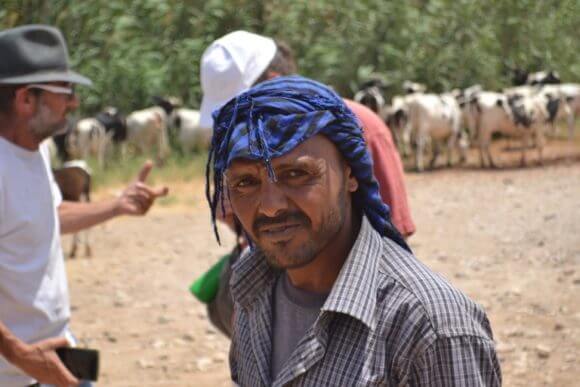
Later, the Ta’yush group sets out for a visit to Um Zukha settlement. An army jeep blocks their way, so Arik Ascherman leads the group up a rocky hillside for a commanding view of the settlement and surrounding valley. The People of Samra village used to live up here, says Ascherman. Then the outpost arrived, followed by an army base, and so now shepherds graze their sheep in the valley. Settlers continue to harass them.
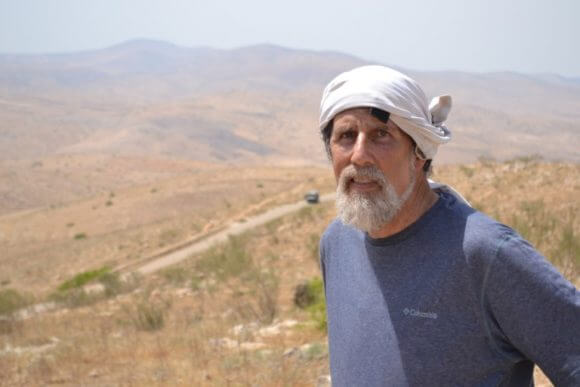
Why can’t Jewish settlers live in peace with Palestinian shepherds, I ask? There’s so few of them, and so much land.
Rabbi Ascherman turns to theology for an answer. “I believe God gave us this land, as a sign of the covenant,” he says. “But there are things that are more holy than land. And it is the human being that was created in God’s image, and not the land, as holy as the land may be. But these people are so blinded by the holiness of the land of Israel, they can no longer see God’s image in the Palestinian shepherd.”

For Guy Hircefeld, the explanation lies elsewhere. We’ve come to the village of Jiblik, between Jericho and the northern Jordan Valley, where Israeli occupation authorities recently bulldozed a cattle shed and home belonging to a man and his six month-pregnant wife (after cutting off the water supply), in order to help the couple re-build.

“It’s sadistic and racist,” says Hircefeld. The controversial comments of Major General Yair Golan, Deputy Chief of Staff of the IDF, during last year’s Holocaust commemoration, come to Hircefeld’s mind.
“This is the way Israel acts. Like Germany in the Thirties.”
Listen to the audio story here.
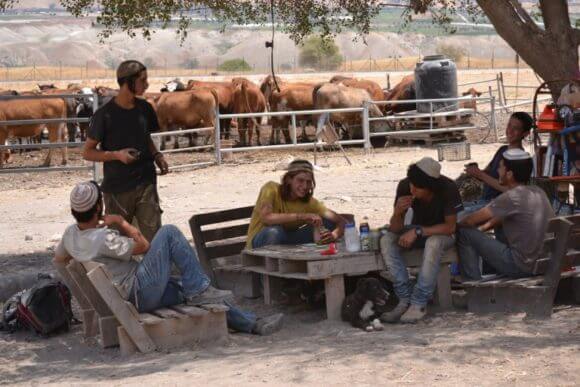
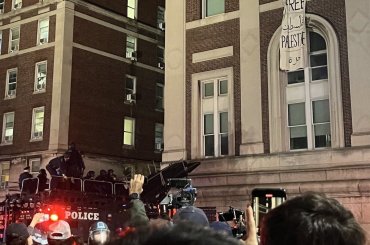
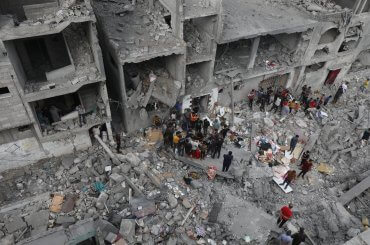
Come on, Emet, Fat Bastard, Hophmi, various Jons, and the rest of the Zionist supporters. Tell us why this is all fine and dandy.
It’s an absolute disgrace that America’s MSM does not report on the grotesque injustices committed by Israel. Not Judy Woodruff, not Rachel Maddow, nobody. And the reason is not that these stories are unworthy. NOTHING negative about Israel is EVER reported, let alone discussed. The reason is that the entire MSM is controlled by zionists. The evidence is plain, and there is no other conceivable explanation for this complete news blackout.
This throttling of America’s “free press” is destroying democracy and America itself. Mark Shields is an ex-Marine asleep at his post, while David Brooks is an Israeli agent, with a son in the Israeli army instead of the American army. For readers who haven’t seen it, historical background on how this came about is online in “War Profiteers and the Roots of the War on Terror”.
For the moment it is Biblemania and the need for water which is driving the land theft and demolition sprees. Can you imagine the situation if major oil or gas resources were discovered in the Occupied Territories? I expect though that the Zioloons would find a chapter in the Book of Whateveronomy which gives them the eternal right to frack around to their heart`s content on stolen land.
Bless.
I believe that there will be a tipping point with this issue in America, just like there was with McCarthyism.
“This is the way Israel acts. Like Germany in the Thirties.”
If I remember right, Hitler’s united Germany had about 90 million people. And a lot more.